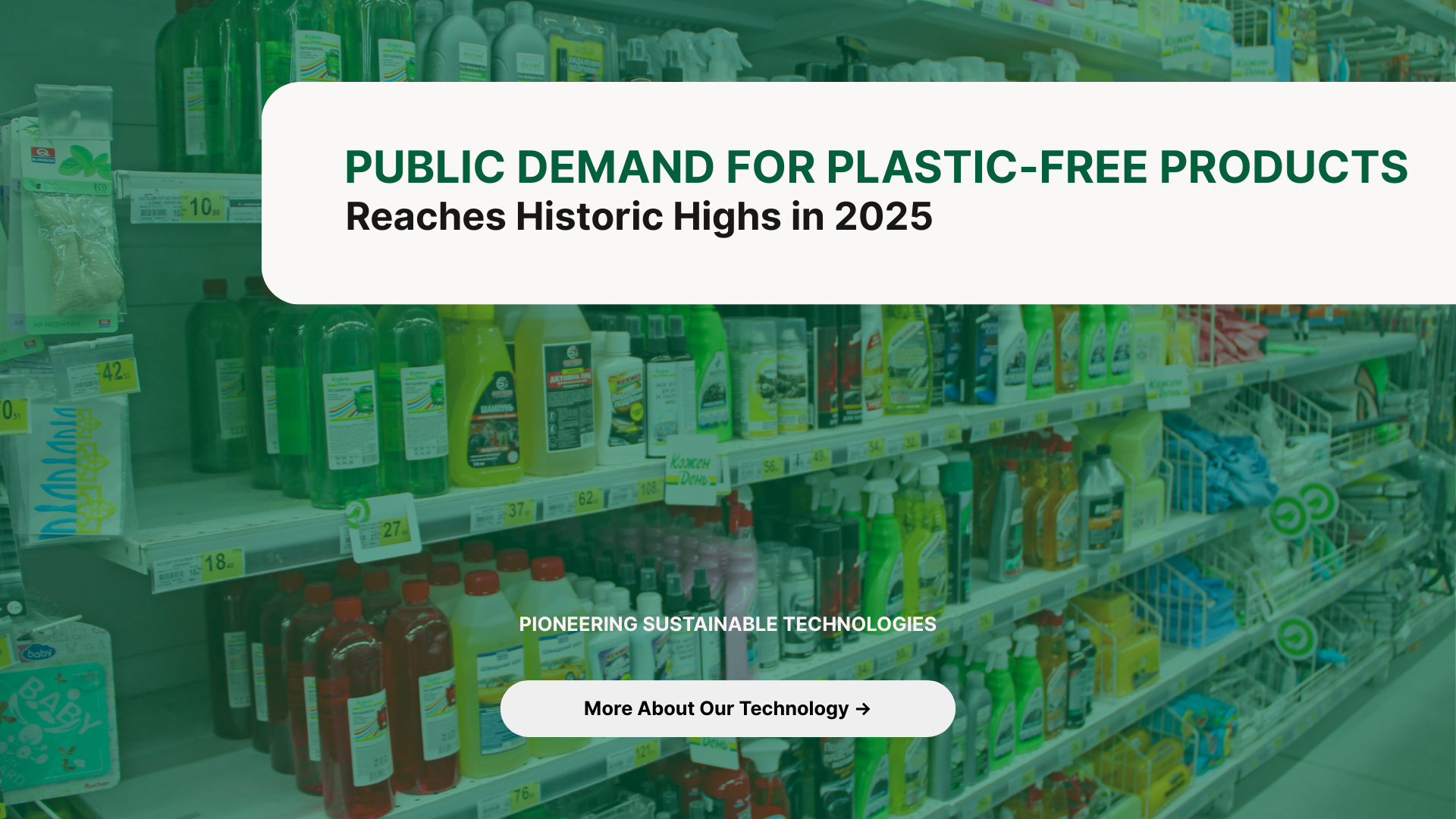In 2025, global consumer behaviour is shifting more rapidly than most brands anticipated. New data shows a sharp increase in public rejection of single-use plastics, especially plastic packaging and bottled water, with sustainability now ranked as a top purchase driver across multiple industries. As governments respond with stricter regulation, companies that fail to adapt to plastic-free expectations are being left behind. Meanwhile, products that are genuinely biodegradable, toxin-free and microplastic-free are gaining market share.
Consumers Are Driving Market Change, Not Just Following It
Until recently, most sustainability movements were led by government policy or niche advocacy. Today, the movement is customer-led. Surveys from institutions such as McKinsey, Statista and the Ellen MacArthur Foundation indicate that more than 70 percent of global consumers actively avoid plastic packaging when alternatives are available. This preference is strongest in younger demographics, particularly Gen Z and Millennials, but is rapidly growing across all age groups.
In Australia, research from the Australian Packaging Covenant Organisation (APCO) shows that 82 percent of consumers believe brands have a responsibility to provide environmentally sustainable packaging. Furthermore, 66 percent of Australians state they are willing to pay more for products packaged in biodegradable or compostable materials.
The Failure of Recycling Has Accelerated the Shift
For decades, consumers were told that recycling would solve the plastic problem. However, widespread media coverage and academic research have revealed that plastic recycling rates remain low. In Australia, less than 30 percent of plastic bottles are recycled. In the United States, the figure drops to 29 percent. Globally, over 400 million tonnes of plastic waste is generated annually, yet only 9 percent is effectively recycled.
Consumers now understand that most plastic ends up in landfill, waterways or incineration facilities. The concept of a “circular plastic economy” is being increasingly viewed as unachievable under current systems. This breakdown in trust has shifted demand towards materials that are not only recyclable but truly biodegradable, meaning they safely return to nature without leaving microplastics or toxic residue.
Biodegradable Packaging Is No Longer a Niche Category
Once relegated to health food stores or boutique brands, biodegradable packaging is now mainstream. Major supermarkets, pharmacy chains and convenience stores have begun replacing conventional plastic containers with certified biodegradable alternatives. Brands offering water, personal care and food products in compostable or plant-based materials are seeing double-digit growth in both revenue and consumer loyalty.
However, not all “biodegradable” claims are created equal. Many so-called compostable products require industrial composting conditions that are not available to most consumers. Others contain hidden fossil polymers or still break down into microplastics. As consumers become more educated, demand is rising for certified, verified and scientifically proven biodegradable materials.
The Rise of Product Transparency and Certification
Greenwashing has become a significant concern. In response, many countries are introducing legal frameworks that require brands to prove the environmental claims on their packaging. Australia’s Competition and Consumer Commission (ACCC) has released new guidance targeting misleading environmental marketing claims. In Europe, the Digital Product Passport will soon require full traceability of product materials and environmental impact.
For biodegradable products, this means third party certification is no longer optional. It is now a requirement for market access and consumer trust. Companies using additives that genuinely allow for full degradation into non toxic compounds, such as The Eco Bottle, are positioned ahead of the compliance curve.
Plastic-Free Water Bottles Gain Competitive Edge
Bottled water is one of the most visible sources of plastic waste. According to a study published in the journal PNAS, bottled water contains up to 240,000 plastic particles per litre, most of which are nanoplastics capable of entering the human bloodstream and brain. Consumers are now actively seeking bottled water options that eliminate plastic exposure entirely.
The Eco Bottle offers a direct solution to this demand. Made from biodegradable polymers with zero microplastics and no fossil-based additives, it breaks down in landfill without releasing methane or contaminating soil and groundwater. Unlike conventional bioplastics, The Eco Bottle does not rely on industrial composting and leaves no trace of microplastic fragments.
Policy and Regulation Reinforce the Shift
In 2025, over 70 countries have implemented bans or restrictions on single-use plastics. The European Union is leading with the upcoming Global Plastics Treaty, which is expected to set binding targets for plastic reduction, biodegradability and corporate responsibility. In Australia, state-based bans on plastic cutlery, straws and packaging have been introduced in New South Wales, Victoria and Queensland.
These policy shifts are not only reactive but proactive. Governments now view plastic reduction as a health and environmental priority, driven by new findings on microplastics in blood, placenta and breast milk. Regulatory alignment with public sentiment is creating a business environment where only truly sustainable solutions can thrive.
Retailers Are Responding to Consumer Demand
Large retailers are updating their procurement and merchandising strategies to favour biodegradable and plastic-free products. Woolworths and Coles have begun phasing out certain plastic-packaged goods in favour of certified alternatives. Globally, Walmart and Carrefour have announced new sustainability targets tied directly to shelf space allocation, rewarding suppliers that reduce plastic content.
This change is being reinforced by investor pressure. ESG frameworks are increasingly assessing plastic use and biodegradability as part of environmental risk metrics. Brands that continue to rely on petroleum-based plastics are experiencing ESG rating downgrades and shareholder concerns.
Beyond Packaging: Full Product Lifecycle Accountability
The plastic-free movement is also expanding into how products are made, used and disposed of. Biodegradable innovations are now appearing in medical devices, consumer electronics, agriculture and clothing. Companies are expected to account for the entire product lifecycle, from raw material sourcing to end-of-life impact.
Technologies like depolymerisation, enzymatic digestion and microbial breakdown are moving from the lab to market. The Eco Bottle, for instance, uses depolymerisation to ensure that it breaks down completely under normal landfill conditions, unlike traditional plastics that degrade into harmful particles over 450 years.
Brands That Ignore the Shift Will Be Left Behind
Public demand has reached a tipping point. Inaction is no longer tolerated by consumers, regulators or investors. Companies that fail to invest in biodegradable solutions risk losing market share, facing legal challenges and damaging their reputations. The era of surface-level sustainability is ending. Only products that deliver measurable, scientifically validated environmental benefits will remain competitive.
Conclusion: Plastic-Free Is the New Baseline
2025 marks a turning point in how consumers, governments and industries approach plastic. Demand for plastic-free, biodegradable and genuinely sustainable alternatives has moved from the fringe to the mainstream. It is not just a trend, it is the future of responsible commerce.
The Greener Tech Group continues to lead by offering solutions like The Eco Bottle that are not only environmentally sound but backed by science, certification and real-world performance. As public awareness grows, so too must the accountability of every brand, supplier and manufacturer that places products into the world.
Key Summary
✓ Over 70 percent of consumers now avoid plastic packaging when alternatives are available
✓ Australia recycles less than 30 percent of plastic bottles, fuelling demand for biodegradable solutions
✓ Biodegradable products like The Eco Bottle are gaining trust due to independent certification and no microplastics
✓ Greenwashing is being challenged by new legal frameworks and certification requirements
✓ Retailers and investors are prioritising plastic-free products across sectors
✓ Plastic-free bottled water options are outperforming conventional brands in growth and consumer confidence
✓ Public policy, health data and consumer behaviour are aligned behind a plastic-free future
✓ Brands that delay biodegradable innovation risk market exclusion and ESG penalties
References
Statista (2023). Majority Supports Global Rules to End Plastic Pollution.
https://www.statista.com/chart/28829/poll-on-rules-to-end-plastic-pollution
APCO (2024). Sustainable Packaging Guidelines
https://apco.org.au/sustainable-packaging-guidelines
WHO (2022). Dietary and inhalation exposure to nano- and microplastic particles and potential implications for human health. https://www.who.int/publications/i/item/9789240054608
New England Journal of Medicine (2024). Microplastics and Nanoplastics in Atheromas and Cardiovascular Events.
https://www.nejm.org/doi/full/10.1056/NEJMoa2309822
PNAS (2024). Rapid single-particle chemical imaging of nanoplastics by SRS microscopy.
https://www.pnas.org/doi/10.1073/pnas.2300582121
European Commission (2025). Digital Product Passport for Circular Economy. https://environment.ec.europa.eu/topics/circular-economy_en
ACCC (2024). Environmental Claims and Greenwashing Guidelines.

